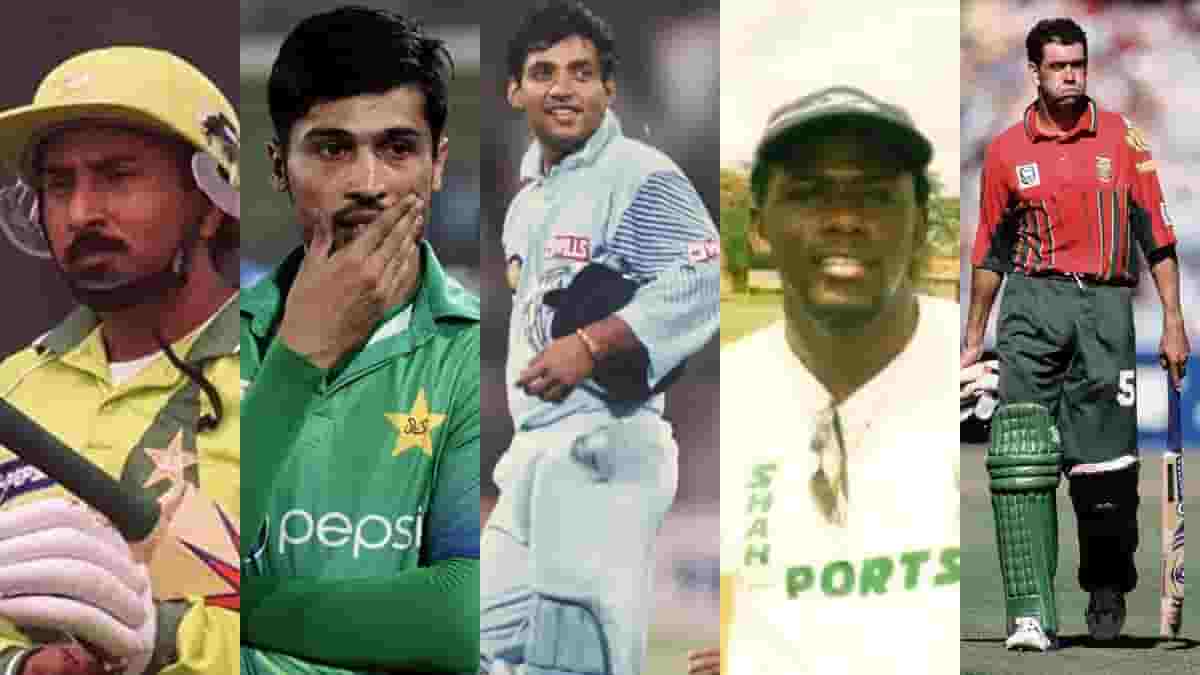
Cricket is one of the most well-known games in the world, and as such, it is sure to draw criminal syndicates looking to profit from it. Match-fixing has grown as an incredibly profitable business for players and criminal syndicates in addition to betting and gambling. The desire for money and the different rewards entice players to comply with the plans of these betters and bookmakers. If caught, such players are imprisoned. The following are some well-known figures from this criminal industry:
Saleem Malika
Malik was a right-handed middle-order batsman who led Pakistan in 12 Tests and 34 One-Day Internationals. Despite being a good batter, his name will go down in history as the first player to be suspended for match-fixing. Saleem was found guilty in a judicial investigation in 2000, shocking the entire country. Shane Warne, Mark Taylor, and Tim May accused him of bribing them to perform poorly during the 1995 Pakistan tour. The Pakistan Cricket Board (PCB) banned Saleem for life; however, the life ban was later lifted based on a judicial decision.
Muhammad Amir
Amir was a talented young Left Arm Fast bowler who made it to the National squad after a lot of hard work. Only in 2010 was he charged with spot-fixing or bowling no balls at certain moments during a test match against England. For all of his wrongdoings, he risked an ICC ban. When the matter was heard in the British Crown Court, he pleaded guilty and was convicted in Southwark Crown Court, where he served three months in prison. However, his youthful age and confession to the court assisted him in reducing the ban.
Muhammad Azharuddin
Azharuddin was a former Indian captain who was widely regarded as one of the top middle-order batsmen of the 1990s. His shots were a visual and auditory delight, and he was applauded for using his wrist. Azharuddin’s name was mentioned in connection with match-fixing in 2000. According to CBI findings, he introduced then-South African captain Hansie Cronje to bookies. The ICC and BCCI both threatened him with a life ban. He was released from a court-ordered life sentence.
Maurice Odumbe
Odumbe’s cricket career was cut short due to his illegal activities as a former Kenyan ODI captain. Odumbe was investigated by the ICC Anti-Corruption Unit in 2004 for collecting money from bookies. Odumbe was barred from international cricket for five years after being found guilty.
Hansie Cronje
The United Cricket Board of South Africa has banned Hansie Cronje for life.
The former South African captain acknowledged to the King Commission that he accepted money from bookmakers and paid teammates to behave poorly in games. All cricket-related activities involving the UCBSA and its affiliates are prohibited.
Ajay Jadeja
In 1999, Ajay Jadeja and four other Indian cricketers were banned after charges of match fixing surfaced. The suspension was later lifted by the Delhi High Court on January 27, 2003, allowing Jadeja to play domestic and international cricket again. He was most known for his aggressive stroke play and precise fielding.
S. Sreesanth
Sreesanth, who completed 27 Tests and 53 ODIs for India, was arrested on 16 May 2013 and released on bail a month later for allegedly receiving money from bookies to underperform. The BCCI banned him from playing cricket for life in September 2013.
The BCCI’s life ban was “set aside” by the Supreme Court of India in March 2019. The country’s highest court has directed the BCCI to “reconsider” and “revisit” the terms of any new ban. Following that, the BCCI reduced his punishment to seven years, allowing him to play all forms of the game beginning September 13, 2020.
Mohammad Asif
Controversies had always been a part of Mohammad Asif’s life. He tested positive for the anabolic drug Nandrolone, which resulted in a career suspension. With an emotional appeal, Asif overcame the ban. The biggest problem, though, was the spot-fixing affair in 2010, which resulted in a seven-year ban from cricket. Asif was found guilty of bowling purposeful no-balls and sentenced to a year in prison at Southwark Crown Court for conspiracy to cheat at gambling and accept corrupt payments.
Lou Vincent
The England and Wales Cricket Board banned Lou Vincent from cricket for life on July 1, 2014, after he admitted to 18 violations of the regulations, including fixing the outcome of Sussex’s match against Kent in 2011, along with Naved Arif, who received a life ban one month before him. On the day he was sentenced to life in prison, Vincent issued a statement confessing his role in match fixing.
Danish Kaneria
Kaneria was Pakistan’s seventh non-Muslim international cricketer, but his career as a leg spinner was cut short by his unlawful activities. After being questioned about match abnormalities in 2010, Danish’s name was removed from the lawsuit after a few months. Kaneria’s name was brought up again in front of the ECB disciplinary panel in 2012, where he was found guilty of spot-fixing in many county matches. The ECB disciplinary panel imposed a life ban on him, with which the PCB concurred. Kaneria’s plea to have the life ban lifted was denied twice by the ECB.
Kaneria admitted to his involvement in the 2009 spot-fixing affair in October 2018, after years of denying his guilt.




